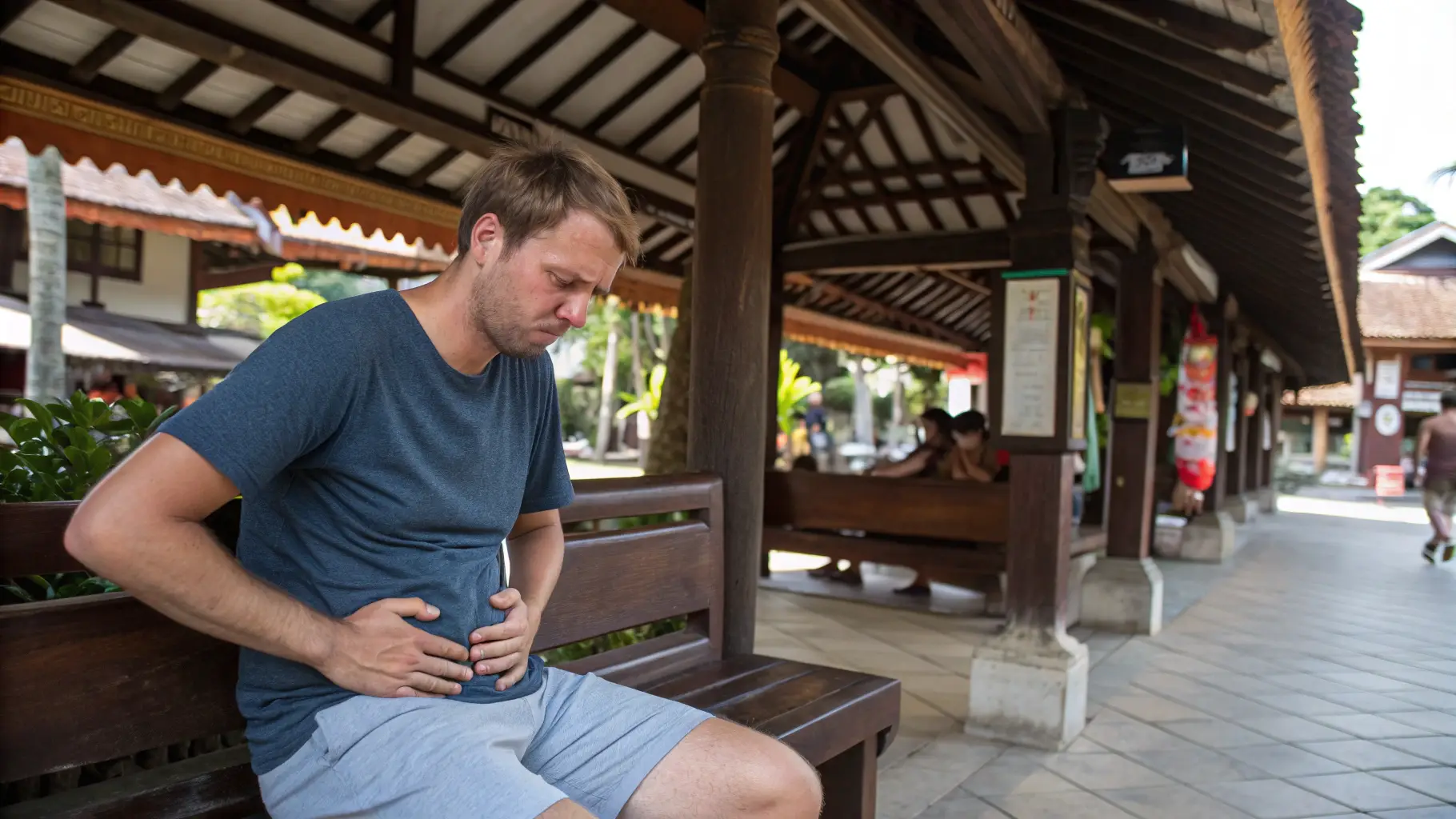Dealing with Bali Belly: Tips and Treatment for Travelers
anita ayu rustyaningtyas
September 1, 2025
10 min read

When planning a trip to Bali, one thing you might not expect is Bali Belly – the common term for diarrhea often experienced by tourists. While this condition is quite common, many people feel worried or unsure about what to do if they suddenly experience it.
Bali Belly usually happens because your body isn’t used to the new environment. Additionally, food or drinks that aren’t hygienic can be the source of the problem. While it’s typically not dangerous, it can drain your energy and ruin your vacation plans. Don’t worry, though – Bali Belly can usually be managed with a few simple steps. If you’re planning a trip to Bali, it’s important to understand what Bali Belly is, how to prevent it, and what to do if you experience it.
What is Bali Belly?
Bali Belly is the common term for the traveler’s diarrhea that many tourists experience when visiting Bali and other tropical destinations. The main cause of Bali Belly is consuming food or drinks contaminated by bacteria, viruses, or parasites. Typically, this happens when your body is not accustomed to the food or water hygiene standards in a new environment like Bali.
If you’ve ever heard the term “Montezuma’s Revenge” in Mexico or “Delhi Belly” in India, Bali Belly is basically the same thing for Bali. While it’s not usually dangerous, Bali Belly can make your vacation less enjoyable. The most common symptoms are diarrhea, nausea, vomiting, abdominal cramps, and bloating.
Causes of Bali Belly
Many tourists often wonder, “Why did I get Bali Belly even though I only ate a little or tried local food?” The answer is actually simple: our digestive system is quite sensitive to changes in environment, especially when traveling to tropical countries like Indonesia. Your immune system may not be used to the types of bacteria or food handling methods in a new place, which increases the risk of digestive issues.
In general, Bali Belly is caused by two main factors:
- Contaminated Food and Water: This is the most common cause. Food or water that’s not prepared hygienically can be contaminated with bacteria, viruses, or parasites. For example, raw vegetables washed with tap water, ice made from unclean water, or undercooked seafood. Once these microorganisms enter the body, they can cause infections that lead to diarrhea, nausea, and other typical Bali Belly symptoms.
- New Environment: Even though the food may seem safe, your body might still react because it isn’t accustomed to the local microorganisms in a new environment. What might not cause a problem for locals can lead to digestive issues for tourists. This is what often surprises travelers, because even if the food is cooked, there’s still a chance that your digestive system won’t accept the “new guests.”
Read more: Complete Guide to Medical Check-Ups in Bali for Expats and Tourists
Symptoms of Bali Belly

Bali Belly can come on suddenly and make your vacation uncomfortable. The symptoms typically appear within hours to a day after consuming contaminated food or drinks. Everyone can experience different levels of severity, but here are the most common signs:
- Diarrhea: This is the primary symptom. You may experience frequent, watery bowel movements, which can be extremely inconvenient during your travels.
- Nausea and Vomiting: Along with diarrhea, many people feel nauseous and even vomit. This discomfort can make it hard to eat or drink, even though your body needs fluids to avoid dehydration.
- Abdominal Cramps and Pain: Bali Belly is often accompanied by stomach pain, ranging from mild cramps to sharp, stabbing pains. Your stomach may also feel “tight,” making it hard to go about your usual activities.
- Bloating: Excess gas in your intestines can cause a bloated feeling, which can be uncomfortable, almost as if there’s pressure inside your stomach.
- Fever and Chills: In some cases, Bali Belly can come with a fever. You might feel hot, weak, and even experience chills, signaling that your immune system is fighting an infection.
- Loss of Appetite: Due to the discomfort in your stomach, you may lose your appetite. However, it’s important to try to eat light, easy-to-digest foods to give your body some energy.
While these symptoms are usually not serious and often resolve within 2–3 days, they can still make your trip challenging. If symptoms last more than 48 hours, worsen, or if you show signs of dehydration like dizziness, dry mouth, and reduced urination, it’s best to seek medical help to prevent the situation from worsening.
How to Prevent Bali Belly
Preventing Bali Belly is much easier than treating it. With a little extra care, you can enjoy your trip to Bali without any digestive issues. Here are some steps you can take:
- Choose Safe Foods: Avoid raw or undercooked foods, especially seafood and meats. If you want to try street food, make sure the place is busy and looks clean. Typically, the more popular the vendor, the less likely their food is risky.
- Drink Clean Water: Always choose bottled, sealed water or water that has been boiled. Never drink from the tap or accept ice cubes from places with questionable hygiene, as they may be contaminated.
- Practice Hand Hygiene: Wash your hands with soap before eating. If you’re on the go and there’s no water available, always carry alcohol-based hand sanitizer. This simple habit can be a huge lifesaver.
- Be Cautious with Spicy and Oily Food: While Bali’s food is famous for its rich flavors and spices, overly spicy or oily food can trigger digestive issues. If your body isn’t used to the local spices, it’s best to start with small amounts.
By following these simple precautions, you can reduce the risk of Bali Belly and enjoy your Bali vacation without digestive worries.
Read more: Why Choose a Medical Concierge Service in Bali? Here’s the Answer!
How to Manage Bali Belly in Bali
If you find yourself with Bali Belly, the first thing to remember is to stay calm. It may be uncomfortable, but most cases can improve with simple care. Here are some steps to help manage the symptoms:
- Stay Hydrated: Fluids are key. Each time you have diarrhea or vomit, your body loses a lot of fluids and electrolytes. Drink bottled water, ORS (Oral Rehydration Salts), or even fresh coconut water to replenish lost fluids. Coconut water is especially great because it contains electrolytes that can help your body recover faster.
- Rest: Don’t force yourself to continue sightseeing when your body feels weak. Allow your body time to fight the infection and restore its energy. Resting well can speed up recovery.
- Follow the BRAT Diet: The BRAT diet (Bananas, Rice, Applesauce, Toast) consists of easy-to-digest foods that won’t overwhelm your digestive system. These foods are gentle on your stomach and can help you feel better while recovering.
- Avoid Certain Foods: Temporarily avoid spicy, oily foods, dairy products, caffeine, and alcohol. These foods and drinks can worsen diarrhea and add to stomach discomfort.
- Use Over-the-Counter Medications if Necessary: Some travelers bring medications like loperamide (anti-diarrhea medicine) or oral rehydration salts. These can help relieve symptoms, but make sure to use them wisely and follow the instructions carefully.
- Intravenous Rehydration Therapy (IV Rehydration): If the symptoms become more severe, especially if diarrhea and vomiting leave you feeling weak, intravenous rehydration (IV) therapy can be a quick solution to combat dehydration caused by Bali Belly. This therapy allows fluids, electrolytes, and nutrients to enter your bloodstream directly, helping your body recover much faster than drinking fluids alone.
When to See a Doctor?

Most cases of Bali Belly improve with rest, hydration, and eating light, easy-to-digest foods. However, there are certain conditions that should not be ignored. If you experience any of the following, it’s time to seek medical assistance:
- Diarrhea that lasts more than 48 hours: If your stomach continues to ache and diarrhea persists for two days, your body may have lost too much fluid and needs further treatment.
- Signs of severe dehydration: Symptoms such as dizziness, a very dry mouth, infrequent urination, or dark-colored urine are signs that your body is severely dehydrated. This can be dangerous if left untreated.
- High fever or chills: If your temperature rises significantly or you experience chills, this could be a sign of a more serious infection, not just mild digestive problems.
- Blood in your stool: Blood in your stool is a serious indication that there’s a problem in your digestive system and requires immediate medical attention.
- Severe abdominal pain: If the stomach pain becomes sharp or unbearable, it could signal complications that can’t be treated at home.
If your Bali Belly symptoms get worse or don’t improve with home treatment, don’t wait. Seek help at a clinic or hospital right away so your condition doesn’t worsen, and you can enjoy the rest of your trip.
Read more: Doctor Home Visit Bali: Bringing Professional Medical Services to Your Doorstep
Practical Solution: Private Medical Concierge by Bali Premium Trip
When you have Bali Belly, the last thing you want to do is leave your accommodation to find a clinic or sit in a hospital waiting room. That’s why Bali Premium Trip offers a much more convenient and comfortable solution: Private Medical Concierge Service.
With this service, medical care can come directly to your hotel or villa. You can rest in the comfort of your accommodation without having to worry about going outside. Some of the most helpful services for Bali Belly cases include:
- Doctor Home Care
Friendly, experienced doctors who speak English will come directly to your location through doctor home care. The examination is thorough, and treatment is provided based on your needs – no need to leave your accommodation. - IV Rehydration Therapy (Intravenous Infusion)
Dehydration from diarrhea or vomiting can make your body very weak. With intravenous rehydration, fluids and electrolytes are delivered directly into your body, which speeds up recovery. Within hours, you’ll start feeling better. - 24/7 Service
Bali Belly can strike at any time, whether in the middle of the night or early morning. Our medical team is on standby 24/7 to assist you whenever you need it. - Privacy & Comfort
All treatments are done in the comfort and privacy of your hotel or villa. No need to worry about crowded places or traveling far. Your privacy is protected, and your recovery process will be much calmer.
With this service, you get not only the right medical care but also an easier, faster, and more comfortable recovery experience – without leaving your accommodation.
Stay Healthy During Your Trip to Bali with Bali Premium Trip
Bali Belly is a condition commonly experienced by tourists, but don’t let it ruin your vacation. With the right prevention steps and prompt treatment, you can manage it easily. If symptoms worsen or you feel dehydrated, don’t hesitate to reach out to Bali Premium Trip. We’re ready to provide our services through Private Medical Concierge, including IV rehydration and doctor home care directly to your hotel, so you can recover quickly and get back to enjoying your vacation in Bali without any worries.
Stay healthy during your trip to Bali with Bali Premium Trip. Contact us for more information or to book a personalized medical service.

Related Article
What Are the Things to Consider When Traveling to Bali During Ramadan?
Many people ask whether traveling to Bali during Ramadan will...
Many people ask whether traveling to Bali during Ramadan will still feel comfortable, and the answer is yes. You can...
9 Tips for Traveling to Bali During Nyepi Celebration You Need to Know!
Bali is known as a destination that always feels alive,...
Bali is known as a destination that always feels alive, with busy beaches, roads that stay active from morning until...
10 Interesting Facts About Nyepi Day in Bali You Should Know
Nyepi Day is one of the most unique and meaningful...
Nyepi Day is one of the most unique and meaningful celebrations in Bali. Every year, the Hindu community in Bali...



